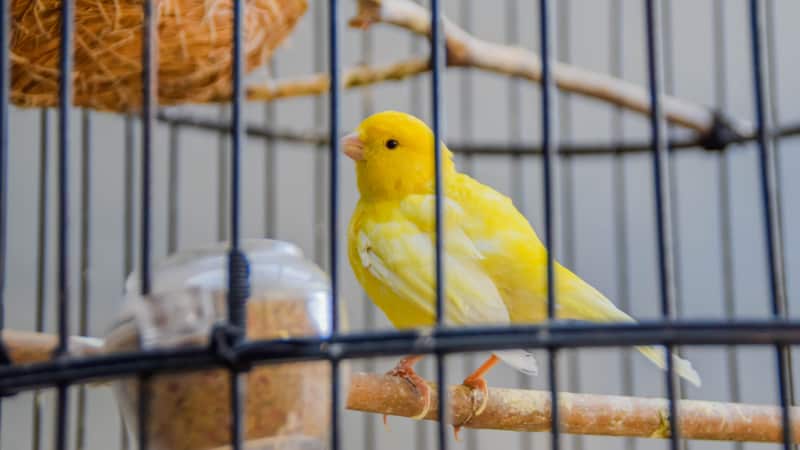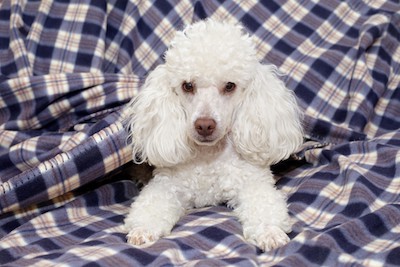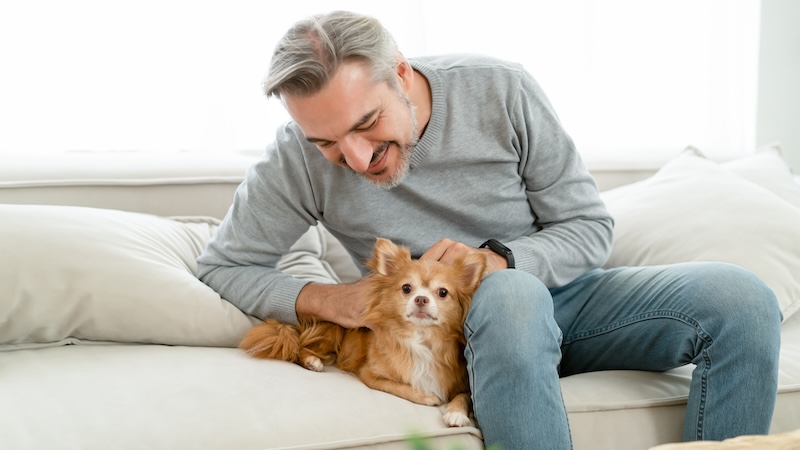How to keep pets safe when painting inside your home
Plus advice on a pooch who only likes the hubby and on a picky puppy

Pet advisor Cathy M. Rosenthal counsels readers on how to keep pets safe from VOC paints, a dog that loves the hubby but is aggressive toward the wife, and a picky-eating puppy.
Dear Cathy: We’re painting the inside of our home. We’ve got two birds. What kind of paint do you think we should use? Also, we’re going on vacation for a week. Would that be sufficient time away for the birds?
– Dee, Sheridan, Michigan
Dear Dee: Fumes from a freshly painted room can be lethal to your feathered friend. There are harmful chemicals in paints called Volatile Organic Compounds, or VOCs. Basically, these are chemicals that are released into the air and can “off-gas” in the home for several years.
When painting with a bird, other pets, or even children in the home, look for low-VOC or zero-VOC paints or paints that are labeled Greenguard certified. There are many major brands that offer these paints now. They aren’t really VOC-free; it just means they have low levels.
Keeping your bird (and other pets) away for a few days is a good thing to do. When you return, open all the windows to let the home air out and keep your bird in a well-ventilated area for a few extra days.
The best reasons for seniors to have a pet
 Dear Cathy: About 10 years ago we adopted a small male poodle. He had been let go because he was aggressive toward the man’s wife. Unfortunately, we have the same problem. During the day, he is lovable and friendly with everyone, including me. He comes to me for attention and to be petted. My husband is elsewhere at these times. However, in the evening when we both relax in the family room, he sits beside my husband, and he is likely to attack me if I make any movement. Needless to say, he is very attached to my husband and always wants to be with him. He tolerates others near my husband grudgingly.
Dear Cathy: About 10 years ago we adopted a small male poodle. He had been let go because he was aggressive toward the man’s wife. Unfortunately, we have the same problem. During the day, he is lovable and friendly with everyone, including me. He comes to me for attention and to be petted. My husband is elsewhere at these times. However, in the evening when we both relax in the family room, he sits beside my husband, and he is likely to attack me if I make any movement. Needless to say, he is very attached to my husband and always wants to be with him. He tolerates others near my husband grudgingly.
I don’t know if this extreme attachment causes over-possessiveness or if it is a form of protection. At the moment, we cope by restraining him, but obviously this is not ideal. He has been prescribed Fluoxetine HCL 10 mg twice daily. Any suggestions to correct his behavior?
– Margaret and Walter, Newport News, Virginia
Dear Margaret: While you can teach an old dog new tricks, it is difficult to change an ingrained behavior that has been around for 10 years or more. I don’t know what your husband does when your dog behaves this way. But if he sits and allows the dog to remain next to him, it is just reinforcing the bad behavior and letting the dog know it’s alright to be aggressive with you.
Instead, your husband needs to stand up and make the dog get off the couch. Then, don’t let him back on the couch for a week. If he gets back on the couch and does this again, keep him off the couch until you can introduce a new routine for him. I know this will be hard for your husband, but when you have a dog who likes one owner and is aggressive with the other, the one he is nice to needs to be clear that the behavior won’t be tolerated, and the best way to do that is remove couch privileges.
While doing this, develop a new routine for him that involves both of you. Take turns brushing him, training him, or playing with him in the presence of the other. Give him a puzzle toy when he cannot get on the couch as a distraction. Start these habits in the late afternoon and move the time you do this forward by 15 minutes each day until you are doing these things in the evening in the family room. We need him to look forward to the evening as time spent with both his “parents.”
If the behavior persists, consult a behaviorist. They can observe what’s happening in real time and help formulate a more comprehensive plan, if needed.
‘Our dog growls at me when she’s with my husband!’
 Dear Cathy: I have a six-month-old Chihuahua/Maltese mix. I have tried many types of food but can’t find one he will eat. Can you help?
Dear Cathy: I have a six-month-old Chihuahua/Maltese mix. I have tried many types of food but can’t find one he will eat. Can you help?
– Marina, Bayshore, New York
Dear Marina: When a puppy doesn’t want to eat, he likely has intestinal worms. When they don’t feel well, they associate the food they are eating as the cause of their physical ailment. Your vet can deworm him, and he will feel better overnight. But it also could be food allergies. Either way, you will have to introduce him to a new food, so look for pet food labeled “limited ingredient diet,” as this often takes care of food allergies.
Cathy M. Rosenthal is a longtime animal advocate, author, columnist, and pet expert who has more than 25 years in the animal welfare field. Send your pet questions, stories, and tips to cathy@petpundit.com. Please include your name, city, and state. You can follow her @cathymrosenthal.
© Tribune Content Agency, LLC


